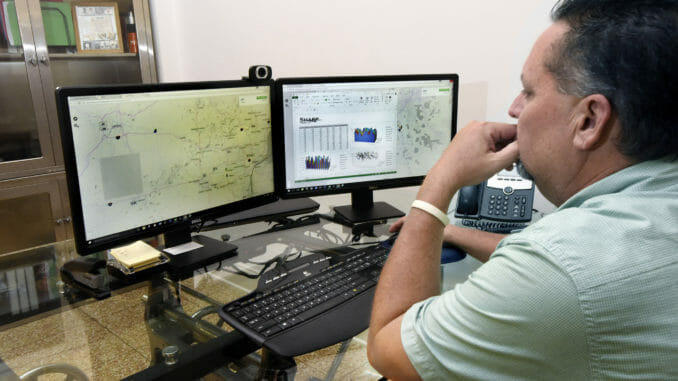
What is the trucking company dispatcher and what is their job?
A dispatcher in simplest terms assigns loads to the company’s drivers. A trucking company dispatcher may be responsible for anywhere from 2 to 60 drivers, more if a fellow dispatcher calls in sick, for instance.
The dispatcher’s job is to get loads across the country. Dispatchers make sure that truck drivers get the loads they want and try to give them the loads that give them the desired home time. Dispatchers need to be reliable, so when drivers call in with issues, they can be reached and can resolve the issue quickly.
You and Your Dispatcher
As in any job, being on good terms with the person responsible for assigning you hours/ loads is something every truck driver should strive for.

You don’t have to go out of your way to try and be extra nice, but thanking your dispatcher after you’ve been helped out of a sticky situation helps strengthen your relationship.
Be patient with your trucking company dispatcher and trust that they are trying their very best to get you home. Calling in multiple times about home time will only bother them.
Eventually, you will become better acquainted with your dispatcher, and they’ll learn how reliable and safe you are on the road.
You might have a hard load ahead of you every once in a while because your dispatcher knows he can count on you to get it there in time. Your “going the extra mile” will be met with reward in time in the form of a better paycheck and better loads.
Tips for Working With Your Trucking Company Dispatcher
A lot of articles out there tell you how to “deal” with a dispatcher, but the driver- dispatcher relationship never needs to be a negative or tense one. Unfortunately, issues may arise from time to time.
There is something that truck drivers (and dispatchers) need to understand: Most dispatchers haven’t driven a truck at all. This leads to a problematic issue of dispatchers giving drivers unrealistic demands. They have no idea which routes are better or worse for traffic or construction, and they often don’t consider the effect weather will have on delivery times.
To help mitigate this issue, keep the following in mind:
- YOU are the driver behind the wheel. You are the captain of the ship, and the dispatcher is certainly not your admiral. Consider them more like your first mate that assists you. If you can’t make a delivery on time, let your dispatcher know. Do not let them force you into being unsafe. Over time, your dispatcher should feel out what times are possible, and which ones are not.
- Never promise to make an exact delivery time, even if it seems to be the easiest of hauls. You never know when equipment will fail, roads will close, or something else will come up. Always tell your dispatcher you will do your best to get the load there on time, but never make a concrete promise.
- Don’t argue with your dispatcher. If the run is unreasonable, then just make an just go with the flow as best as you can. You won’t get in trouble if the delivery schedule is impossible to do safely. This doesn’t mean you can be lazy or lackadaisical, but don’t sweat too much. If you disagree about the schedule, don’t stir up a storm over the phone, or in person for that matter.
- If you’re running tired and a dispatcher insists that the load get to the customer on time, even after you told him that you’ll do your best, ask to speak to your safety manager. You can never be forced to drive when you feel that you are in an unsafe situation, so don’t feel intimidated by someone behind a computer screen. Always put your safety first!
- Keep notes listing anything unreasonable that your dispatcher asks you to do. Hopefully you won’t need this.
- Last resort: If your dispatcher is really giving you a miserable time and acting like they can boss you around, you may need to remind them that they don’t sign your paycheck, but the company does. Of course, be very careful with saying anything like that, but it’s better than raising your voice and arguing.
There are plenty of scenarios where new drivers can get screwed over by dispatchers. Generally speaking, good dispatchers = good company, but don’t get discouraged if you get the bad apple of the bunch. Stay respectful and if it gets that bad, talk to your supervisors and request for a different dispatcher. (Your personal notes would come in handy here).
Just remember that you call the shots regarding your own safety. Your dispatcher should be your trusty wingman, and if the two of your develop a strong working relationship and show that you’re a good, responsible driver, you’ll soon find yourself getting better loads, getting your home time on time, and making better money.
